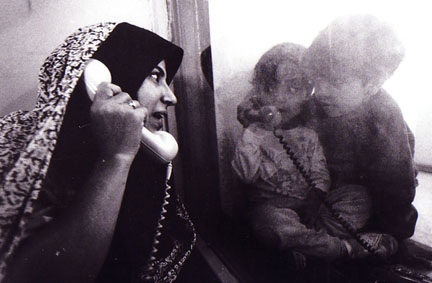|
The beauty of a woman is not in a
facial mode, but the true beauty in a woman is reflected in her soul. It
is the caring that she lovingly gives, the passion that she shows. |
|

|


Women
in Prison

Kobra
Rahmani's husband demanded her execution
(Persian)

Unknown
destiny of 32000 Iranian women married to refugees from
Afghanistan
(Persian)

Amina lawal’s stoning sentence is overruled
The fight to abolish stoning law is continuing
Human rights and women rights defenders, freedom loving people
Our international campaign to save Amina Lawal has finally paid off and her stoning sentence was overruled. This was a tremendous victory for all those involved specially thousands of freedom loving people around the world whom lent their support to this worthy humanitarian cause.

Amnesty - alarming
scale of violence against women
A new Amnesty International study has concluded
that one in three women or up to one billion of the
world's women faced serious violence in their lifetime. This
abuse is at the core of every society, in every country, in
the bedroom and on battlefields, Amnesty says. Its report
highlights female genital mutilation, so-called "honour"
killings and sexual exploitation. Each year two million girls
aged between five and 15 are forced into the commercial sex
market. In some societies, up to 70 percent of murder victims
are women who are killed by their male partners.

Afghan
province bans women performers on TV, radio
Reuters,,
April 17, 2004
JALALABAD,
Afghanistan, April 17 (Reuters) - An Afghan province has
banned women from performing on television and radio,
declaring female entertainers un-Islamic, a provincial
official said on Saturday.
The ban in Nangahar, a southeastern province heavily patrolled
by U.S.-led troops hunting for Islamic militants, took effect
from Friday and also covers women presenters of news and other
information, the official said.
The decision echoes the strict imposition of sharia Islamic
law imposed during the Taliban's repressive five-year rule of
Afghanistan when television was banned, women were forbidden
from working and girls were kept out of schools.
It also follows a heavily debated decision by Kabul Television
in January to show an old tape of Parasto, a popular woman
singer who now lives in the West, in a move that brought a
controversial end to a long-running ban on women singers.
Moderates have said showing women singers on television was in
line with the new Afghan constitution as it gave equal rights
to women.
But some provinces remain deeply conservative and provincial
governors command broad authority over their regions, often in
defiance of the central government.
Nangahar, which borders Pakistan, is one of several regions
where the United States has stepped up a hunt for Osama bin
Laden's al Qaeda network and remnants of the Taliban militia
that U.S.-led forces drove from power in late 2001.
Diplomats said Nangahar's ban would be seen as a setback for
moderates in President Hamid Karzai's government in their
battle with conservatives opposed to liberalisation since the
Taliban's overthrow.

Woman's
day in Iran
sent by : Sadaf Kiani

March 8th, International
Woman's Day


Author
fights for women's rights in her native Iran
Azar Nafisi is uncomfortable with conformity.
She was expelled from her teaching job at the University of
Tehran in 1981 for refusing to wear the mandatory Islamic veil.
In 1995, she resigned from a teaching job at Allameh Tabatabaii
in Tehran, where she had been wearing the veil incorrectly,
rather than bow to pressure to change.
(Click to Read)

Arab Women Rise
Regarding Rainia
Stepping out of her
gunmetal-gray SUV and striding into the compound of Amman's
Kamalia School for Girls, Rania al Abdullah doesn't fit the
prim, circumspect image of an Arab Queen. For one thing, she's
wearing a snug-fitting metallic gold top, matching pants and
two-inch heels, and her mane of glossy brown hair brushes across
her shoulders as she walks.
(Click to Read)

Afghan
ruling council gets earful from one of its few female delegates
While an online news
story said she caused a controversy that "threatened to overshadow
the work of the council," reporters Bashir Gawkh and Danish
Karokhel, writing for the Institute for War and Peace Reporting
(IWPR)
project, filed an Internet report observing that Malalai had
"broken through the wall of silence for ordinary people" and
captivated regular Afghans who had not cared much about the business of
this loya jirga.
(Click
to Read)

|

